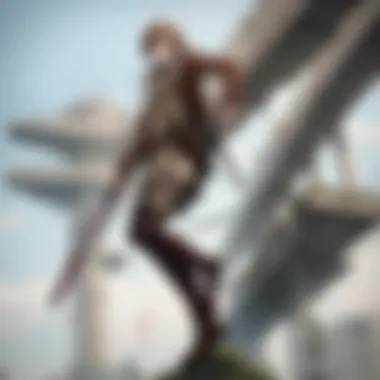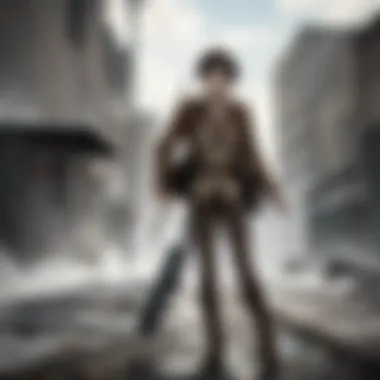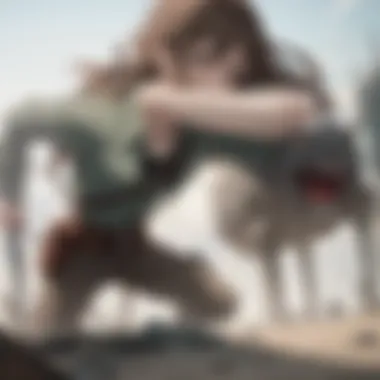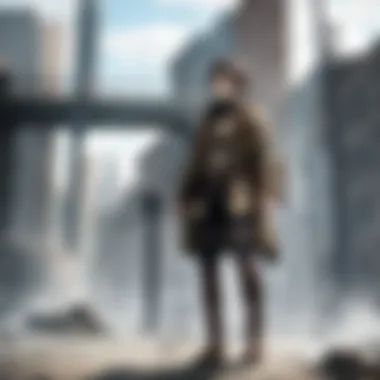In-Depth Analysis of Attack on Titan Season 4 Episodes


Intro
In the expansive universe of Attack on Titan, Season 4 stands as a critical juncture. It marks the culmination of intricate narratives and evolving character arcs. As we delve into this comprehensive overview, we will dissect episodes with a focus on character development and thematic exploration. Understanding these elements not only enriches our viewing experience but also adds layers to the ongoing discussions among anime and manga enthusiasts.
Character Analysis
Overview of Character Development
The final season introduces a blend of familiar faces and new players on the field. Notably, Eren Yeager takes a dark turn as he grapples with newfound power and moral ambiguity. Initially, his motivations stemmed from a clear desire for freedom, but these motives become increasingly complex. His evolution prompts viewers to scrutinize what it means to achieve liberation at any cost.
Conversely, characters like Armin Arlert and Mikasa Ackerman exhibit substantial growth as they confront their friend’s drastic changes. Armin's transition from a timid boy to a commanding figure illustrates the thematic tension between pacifism and violence. Likewise, Mikasa's struggle with her loyalty to Eren speaks volumes about her character depth and emotional turmoil.
Other notable characters, such as Zeke Yeager and Reiner Braun, are also fleshed out in this season. Zeke's internal conflict reveals his longing for acceptance while challenging the dichotomy of ally and enemy. Reiner’s descent into despair prompts a reevaluation of his role in the series and the weight of his actions.
Key Relationships and Dynamics
The intricate relationships in Attack on Titan amplify the stakes and the emotional resonance of the narrative. Eren's relationships are fraught with tension and betrayal. His bond with Mikasa and Armin serves as a reminder of their shared history, contrasting sharply with his new alliances. Similarly, the dynamic between Eren and Zeke showcases a conflicting blend of brotherly ties and ideological differences.
The clash between the Warriors and Survey Corps further deepens the narrative. Characters like Levi Ackerman, who represent hope and resilience, add tension to encounters filled with grief and anger. The duality of relationships, where enemies find common ground or allies turn adversaries, creates a labyrinth of emotions that captivate viewers.
"Character dynamics drive the narrative, providing depth and urgency to the unfolding events in Attack on Titan."
Thematic Exploration
Central Themes and Messages
Season 4 seamlessly integrates themes of freedom, betrayal, and the cost of war. Eren’s quest for freedom starkly juxtaposes the ensuing chaos. The packed trouble underscores the philosophical questions around the nature of liberty—who deserves it, and who pays the price? This thematic depth resonates throughout the episodes, prompting viewers to engage critically with the content.
Moreover, discussions around morality and justification for actions taken during conflict are prevalent. The characters’ decisions serve as a microcosm of larger ethical dilemmas, reflecting both the hero's and villain's perspectives.
Cultural Context and Influences
The cultural backdrop of Attack on Titan draws from historical narratives, particularly touching on themes reminiscent of colonialism and oppression. The exploration of Marley and Eldia serves as a metaphor for real-world issues, providing a commentary on power dynamics and systemic inequalities. These themes resonate strongly in today's global climate, prompting discussions about identity and history.
Understanding these contexts enriches the experience of viewing the series. It allows fans to appreciate not only the artistry of Hajime Isayama, the creator, but also the intricate storytelling that demands reflection.
In summary, Attack on Titan Season 4 offers a profound narrative tapestry woven from character development and thematic richness. The exploration within this section of the article aims to provide insights not only for new viewers but also for returning fans keen on dissecting the complexities within this acclaimed series.
Preamble to Attack on Titan Season
The final season of Attack on Titan marks a pivotal moment in the series. This section aims to provide a thorough examination of the importance and context of Season 4 within the broader narrative structure. The transition from previous seasons to this last installment gives insight into character evolution, thematic developments, and political motivations that drive the story forward.
Overview of the Series
Attack on Titan originated from the mind of Hajime Isayama. Since its debut, it has evolved into a phenomenon, blending complex storytelling with diverse character arcs. The series narrates humanity's struggle against colossal titans that threaten their existence. As the story unfolds, layers of political intrigue and moral ambiguity emerge. Throughout its seasons, the show has captivated audiences with its intense action and thought-provoking themes.


In Season 4, the stakes are raised significantly. The production quality remains high, with superior animation and attentive detail. The last season reconsiders earlier narratives, challenging viewers to reassess the characters they thought they understood. Tensions rise as characters confront their pasts and question their loyalties.
Significance of Season
The significance of Season 4 cannot be understated. It serves as the culmination of years of storytelling, tying together various narrative threads established in earlier seasons. The season shifts perspectives, illustrating the broader conflict beyond Paradis Island. Fans witness the unfolding consequences of actions taken by characters in prior seasons. Key themes, such as freedom, sacrifice, and the cycle of hatred, come to the forefront in this phase, prompting viewers to confront uncomfortable questions about morality.
Additionally, this season offers substantial character development. It positions former antagonists in roles where their motivations are more understandable, fostering empathy and complexity. The audience sees characters like Eren Yeager evolve into figures who embody the uncertainties of their world.
"The essence of Attack on Titan lies in its philosophical inquiries and character-driven narratives. Season 4 amplifies these elements to their peak."
In summary, Season 4 serves as both a conclusion and an expansion of the Attack on Titan universe, enriching the narrative landscape. Its importance to the overall series is fundamental in terms of its closure and critique of many core themes.
Episode Summaries
The Episode Summaries section is vital in delivering a focused analysis of each episode within Season 4 of Attack on Titan. It allows the audience to navigate the complexities of the narrative and understand critical developments that shape the story. Each episode serves as a building block in the overarching plot, contributing to character arcs, themes, and viewer engagement. By summarizing these episodes, the article highlights key events and character decisions, enabling readers to grasp the nuances that drive the series forward.
Episode One: The Final Season Begins
The first episode introduces a stark shift in tone, moving away from the familiar struggles within the Walls. This Episode One sets the stage for the final conflict between Marley and Paradis. Eren Yeager, now a central figure with a darker resolve, emerges. The episode delves into the perspectives of Marley’s warriors, such as Reiner Braun and Gabi Braun, providing insights into their motivations and the stakes of war. The animation quality is striking, drawing viewers into this new world. Eren’s actions and the implications of declaring his intentions create an atmosphere of anticipation.
Episode Two: The War for Paradis
Episode Two escalates conflict, focusing on the war strategies and the underlying emotions of the characters. The episode showcases the antagonism between the Armored Titan and the Jaeger brothers, reflecting a battle not just between titans but ideologies. Viewers witness the effects of the war on ordinary citizens, a theme that resonates throughout the series. Unique alliances and betrayals begin to form, adding layers to the narrative.
Episode Three: The New World
In Episode Three, the theme of identity surfaces. Eren’s transformation is juxtaposed against the backdrop of Marley’s military campaign. The episode emphasizes the price of freedom and the moral dilemmas faced by characters like Eren and Mikasa. New characters are introduced, expanding the universe further. The episode not only heightens tension but also deepens the emotional stakes, leaving the audience pondering the nature of their heroes.
Episode Four: The Reality of War
The title of Episode Four speaks volumes. The storytelling pivots, revealing the brutal consequences of war. With unexpected twists, motivations are challenged, and loyalties questioned. The devastation experienced by both sides serves as a reminder of the cycle of violence. This episode compels viewers to confront the harsh truths that come with battle, significantly altering their prior perceptions of the conflict.
Episode Five: Paths of Destiny
Episode Five dives into the connection between individual choices and broader consequences. The paths taken by Eren and other characters take center stage. Each choice reverberates through the ongoing saga. Emotional encounters between characters breathe life into the narrative, humanizing the overarching conflict. This episode also highlights the intersections of fate and free will, compelling the audience to reflect on their interpretations of justice and revenge.
Episode Six: The Breakthrough
The final episode discussed here, Episode Six, culminates the storyline seen so far. It presents a significant breakthrough, not only in plot but in terms of character evolution. The tensions rise dramatically, and key revelations shake the foundation of alliances. Eren’s relentless pursuit for freedom takes a critical turn here, forcing viewers to confront what they may have underestimated about his character. The choices made here pave the way for an unexpected climax.
This Episode Summaries section provides crucial insight into how individual episodes contribute to the broader narrative framework. Analyzing each episode assists in understanding character motivations, conflicts, and thematic explorations in Attack on Titan Season 4.
Character Development
Character development plays a crucial role in the storytelling of Attack on Titan, particularly in Season 4. This season delves deeper into personal growth, moral dilemmas, and complex relationships. The transformations of iconic characters add a richness to the narrative, reflecting the profound effects of war, loss, and the quest for identity. Understanding character development is instrumental as it not only shapes the series' plot but also engages viewers on an emotional level.
Eren Yeager: A Transformative Journey


Eren Yeager's evolution throughout Season 4 is pivotal and thought-provoking. Once driven by a desire for vengeance against Titans, Eren's perspective shifts dramatically. His new viewpoint reflects a darker understanding of freedom and consequence. Rather than being the hero fighting for humanity, Eren becomes an embodiment of moral ambiguity. This transformation elicits mixed reactions from fans and forces viewers to confront uncomfortable truths about his choices.
Eren's journey illustrates the theme of sacrifice. He wrestles with the notion of what it means to truly be free. His choices lead to significant plot developments that challenge the viewer's perception of right and wrong. His character raises questions about whether the ends justify the means. Eren's trajectory encapsulates the bitter realities of conflict, making him one of the most intriguing characters in the series.
Mikasa Ackerman: Loyalty and Conflict
Mikasa Ackerman's character centers around loyalty and emotional conflict. As Eren's protector and close friend, Mikasa’s struggles are deeply tied to her attachments. Season 4 presents her as torn between her unwavering loyalty to Eren and her moral compass. This inner conflict is palpable, particularly as Eren pursues his controversial plans.
The stakes are high for Mikasa. Her internal battles underscore her development from a fierce warrior to an individual grappling with complex feelings. The season explores her identity beyond her relationship with Eren. Viewers witness Mikasa's growth as she learns to navigate her feelings of loyalty, personal agency, and the consequences of a life consumed by duty. This nuanced portrayal adds depth to her character, making her one of the emotional anchors of the series.
Armin Arlert: From Boy to Leader
Armin Arlert’s growth into leadership stands out in Season 4. Initially portrayed as timid, Armin showcases remarkable evolution in his ability to influence others. His strategic thinking and compassion are essential as the plot unfolds. Armin continually grapples with his role in the conflict, particularly juxtaposed against the more aggressive Eren.
As a character, Armin embodies hope and reason in an increasingly chaotic environment. His friendship with Eren and Mikasa shapes his decisions, but he also represents a contrasting ideology. Viewing challenges through a lens of diplomacy, Armin’s choices reveal his growth. His journey from passive observer to a proactive leader highlights the importance of courage and ideals in shaping a better future, even amid despair.
Reiner Braun: The Anti-Hero Archetype
Reiner Braun serves as a profound example of the anti-hero archetype in Attack on Titan. Throughout Season 4, Reiner's complex background adds layers to his character. Initially introduced as a formidable adversary, his duality becomes apparent. The audience learns about his internal struggles, guilt, and divided loyalties through his narrative.
Reiner's character challenges traditional notions of heroism. As he confronts his past decisions, viewers see how these haunt him. His attempts at redemption and understanding his place in this brutal world resonate strongly. He embodies the human cost of conflict, illustrating how war shapes identities and moral frameworks. Reiner's journey speaks to the tragic consequences of his actions, creating an empathetic figure despite his previous antagonistic role.
Themes and Motifs
The themes and motifs in Attack on Titan Season 4 are crucial to understanding its narrative depth. They serve as the lens through which viewers can analyze character motivations, conflicts, and the overall message of the series. Each theme reflects complex ideas about human nature, society, and the struggles faced by individuals within a larger context. By delving into these themes, one gains insight into how the series comments on real-world issues and challenges.
The Nature of Freedom
The quest for freedom is a central theme in Season 4. Characters grapple with the meaning of liberty and its implications. Eren Yeager, in particular, becomes a symbol of this struggle. Early in the season, he questions what it means to be free. Is freedom merely the absence of physical restraints? Or does it encompass a broader existential state? His actions prompt others to reflect on their own beliefs about freedom.
The narrative illustrates that freedom often comes at a steep price. The Marleyans and Eldians are locked in a battle where both sides believe they are fighting for their liberty. This duality presents a nuanced view of freedom — it is not just a desirable state but a complex and often painful reality. As the story unfolds, the characters' journeys highlight that freedom can lead to unintended consequences, forcing them to reconcile personal desires with collective responsibility.
The Cycle of Hatred
Another significant motif in the final season is the cycle of hatred that perpetuates conflict. This theme is explored through several character arcs, particularly that of Eren and Reiner Braun. Both characters are products of their environments, shaped by the animosity between their respective peoples.
Eren's decisions are often driven by a deep-seated desire for revenge against those who wronged him and his friends. Conversely, Reiner embodies the struggle of being caught between two worlds. The intense emotions of anger and retribution serve to highlight the cyclical nature of hatred. The series suggests that this cycle can only be broken through understanding and empathy, yet many characters find it difficult to escape their ingrained beliefs and biases.
This examination of hatred resonates with real-world conflicts, encouraging viewers to reflect on the sources of enmity in society and the potential for healing. The characters’ struggles offer a commentary on how deeply entrenched animosities can cloud judgment and perpetuate violence.
Identity and Self-Discovery
Identity and self-discovery are profound themes interwoven throughout Season 4. Characters face existential crises, prompting them to reevaluate who they are and what they stand for. Eren’s transformation into a darker figure raises questions about identity — is he still the hero, or has he become the villain?
This theme is explored through various perspectives. Each character reflects their inner turmoil regarding their actions and allegiances. For instance, Armin struggles with the weight of leadership and the burdens that come with it. His journey to self-acceptance showcases the challenges of stepping into a role meant for him while remaining true to his ideals.
The theme of identity encourages viewers to contemplate their beliefs and the impact of society on self-perception. As characters grapple with their roles in a tumultuous world, they embody the search for authenticity amidst chaos. This exploration invites audiences to think critically about their own identities and the influences around them.


Critical Reception
In the landscape of anime, the critical reception of any season can serve as a lens through which its artistic merit and audience engagement are assessed. For Attack on Titan Season 4, this evaluation goes beyond mere opinions; it provides insights about its impact on fans and the broader narrative. Understanding audience reactions alongside critical evaluations helps us grasp the multifaceted nature of the series. This section will delve into notable responses and assess critical commentary, highlighting elements that enrich the overall experience of Attack on Titan.
Audience Reactions
From its initial airing, Attack on Titan Season 4 sparked diverse reactions among fans. Many viewers were eager to see how the story concluded, particularly how character arcs would resolve.
- Emotional Investment: Fans expressed profound emotional ties to the characters developed throughout preceding seasons. Eren Yeager’s drastic transformation, for instance, elicited mixed feelings; some viewers admired his resolve, while others felt conflicted or betrayed.
- Expectations vs. Reality: The shift in narrative focus presented challenges. Some viewers praised the expanded world-building and introduction to new characters. However, others preferred the intense focus on original protagonists, feeling a loss in storytelling cohesion.
- Viewer Engagement: Online platforms like Reddit and social media saw heated debates about pivotal plot points. The engagement showcased how deeply invested fans were in the series. This level of interaction illustrates the series' significance in popular culture and its capacity to provoke thought.
Critical Assessments
Critics of Attack on Titan Season 4 approached the final season with varied analyses, reflecting on both narrative development and thematic depth.
- Narrative Complexity: Many commentators have lauded the intricate plotting as the show deepens its exploration of difficult themes such as morality, freedom, and the consequences of war. Critics argue that this complexity enhances the viewer's experience, offering more than mere action and spectacle.
- Character Depth: Assessments often highlight character development, particularly focusing on how various identities and motivations shape the story. Eren’s controversial choices serve as a focal point for debate among critics, with some suggesting they represent a poignant commentary on human nature and conflict.
- Visual and Audio Excellence: Aside from thematic content, many reviews emphasize the high production quality. The animation by MAPPA and the captivating soundtrack contribute significantly to the immersive experience, maintaining a standard that demands respect in the industry.
In summary, the critical reception of Attack on Titan Season 4 reflects a rich tapestry of audience involvement and expert analysis. This dynamic interplay showcases the series' profound impact and underscores its importance as a significant work in modern anime.
Controversial Aspects
The final season of Attack on Titan has sparked significant debate among fans and critics alike. This section seeks to unravel the complexities of the controversial elements within the series. Understanding these aspects is crucial, as they not only shape viewers' perceptions but also reflect broader societal issues. The portrayal of war and the disputes surrounding the ending of the series highlight the underlying themes that resonate with audiences. By critically analyzing these elements, one can grasp the depth of Attack on Titan's narrative and its impact on popular culture.
Portrayal of War
The depiction of war in Attack on Titan serves as a powerful commentary on the nature of conflict and its consequences. Throughout Season 4, viewers witness the brutal realities faced by both the people of Paradis and Marley. The narrative does not shy away from showing the devastation caused by war, emphasizing its toll on civilians and soldiers alike.
Key points regarding the portrayal of war include:
- Human Cost: The series underscores the emotional and psychological scars inflicted on characters. The audience sees beloved characters facing moral dilemmas and the destruction of their ideals.
- Complexity of Motives: The show portrays the intricacies of motivation behind war. It's not merely a clash between good and evil, but a struggle influenced by history, ideology, and survival.
- Cycle of Violence: The portrayal of war reflects on how cycles of violence perpetuate conflict. The series carefully navigates the narrative to suggest that peace is not merely the absence of war but requires reconciliation and understanding.
"The portrayal of war in Attack on Titan speaks volumes about the societal impacts of conflict, urging viewers to reflect on real-world issues."
Ending Disputes
The ending of Attack on Titan has ignited discussions regarding narrative resolution and character arcs. Many fans had high expectations for how the story would conclude, given its rich themes and character development. However, the finale has left some feeling unsatisfied, leading to polarized opinions.
Considerations surrounding the ending include:
- Character Outcomes: Fans reacted strongly to the fates of central characters like Eren, Mikasa, and Armin. Some feel that their arcs did not reach a satisfactory conclusion, impacting their emotional investment in the story.
- Thematic Resolution: The thematic elements introduced throughout the series, such as freedom and identity, are reexamined in the final episodes. However, some argue that the resolution of these themes was not adequately addressed, leaving lingering questions.
- Fan Expectations vs. Creator Intent: There is a notable tension between what fans expected and what the creators intended. This discrepancy has fueled discussions about authorial intent and the relationship between creators and audiences.
Through these discussions, it becomes clear that the controversies surrounding Attack on Titan are multifaceted and contribute significantly to the series' legacy. They challenge viewers to think critically about not only the fictional world but also how these themes resonate in their own lives.
Closure
The conclusion of this article serves as a pivotal moment to synthesize the insights gained from analyzing Attack on Titan Season 4. This final season marks a significant evolution in both narrative and character development, wrapping up various arcs that have been building throughout the series. It is crucial to reflect on how the intricate storytelling and thematic depth resonate with audiences, ultimately shaping their engagement with the series.
Reflecting on the Series
One of the most significant aspects to consider when reflecting on the series is its continuous exploration of the human condition. The characters face moral dilemmas that make them confront their own motivations, desires, and fears. As the season progresses, viewers witness profound transformations, particularly in figures like Eren Yeager and Reiner Braun. Their journeys highlight the complexity of identity and the impacts of war. The narrative not only entertains but also compels its audience to think critically about the nature of freedom and the consequences of choices made under duress.
Future Implications for the Franchise
Looking toward the future, the implications of Season 4 for the Attack on Titan franchise are substantial. The conclusion has opened various pathways for potential spin-offs or side stories, delving deeper into the lore of the world created by Hajime Isayama. With the established fanbase and the rich thematic material, there is a strong foundation for further exploration of characters, societal structures, and the aftermath of conflicts presented in the series. The reception of the final season will undoubtedly influence the direction of any future projects, potentially guiding creators in addressing unresolved questions or expanding the universe to enrich the narrative experience for longtime fans.















